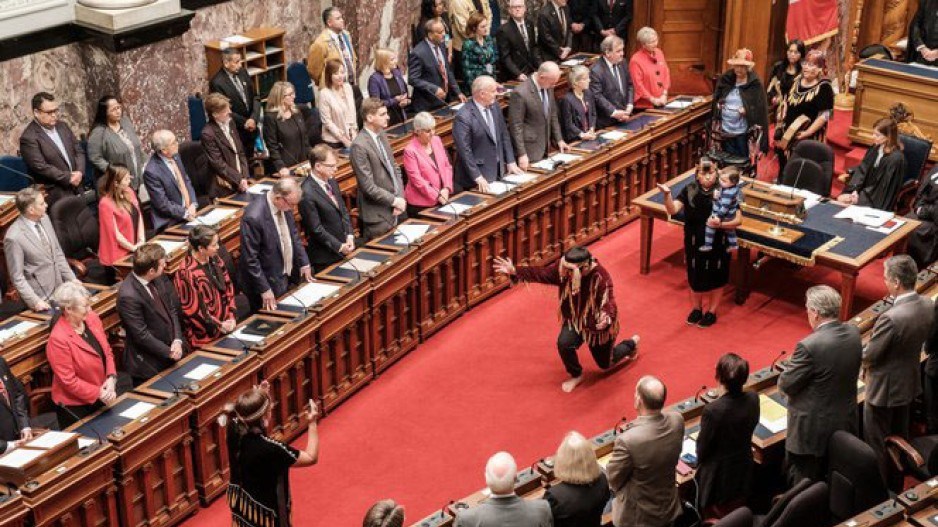B.C. mineral staking is like online gaming.
With the click of a button, any would-be millionaire takes their chance to strike it rich.
The odds of success are extremely low, the wagers are typically made with other people’s credit and, seemingly, the house always wins.
The Crown is the house and greatest beneficiary, as they profit from highly taxed profit margins that ultimately exploit the gamer. The truth is, though, the Crown is dependent on the outcome and has itself become vested in gamers’ losses and successes.
The B.C. mining regime is akin to regulating an illegal activity (under the Criminal Code, gaming houses are illegal unless the Crown authorizes them). The illegal activity is the granting of rights to exploration and mining companies on First Nations title lands without their consent. The entire mining regime is based on the theft of First Nations subsurface minerals. It is deeply rooted in the racist and colonial doctrine of discovery and terra nullus that we recently witnessed the Pope apologize for and reject.
So, what does this analogy have to do with B.C.’s Declaration of the Rights of Indigenous Peoples Act (DRIPA) and mineral tenure reform? Well, to be blunt, we need to start this process with Truth if we are to achieve Reconciliation. We cannot rebuild a Mineral Tenure Act or Mines Act (or any legislation) to be “consistent with UNDRIP” on illegal concepts of ownership. The Crown also must come clean with the fact that it has a vested interest in the continuation of the current regime. These are hard truths and so far, they are not accepted.
We are a crossroads on implementing UNDRIP in B.C. Beautiful political platitudes, deeply respectful land acknowledgements and good faith are being tested. The reform of B.C. mining law is the first truly land-based statutory regime to enter into the queue and it forces a convergence of conflicting interests. It is the epitome of fear and fearmongering where some will argue that transformative change will cause a certain economic Armageddon.
The crossroads are apparent because the B.C. government is currently committed to reform the Mineral Tenure Act through the DRIPA Action Plan on the one hand. And, on the other hand, Crown counsel is making written and verbal legal submissions in the Gitxaaxla case before the B.C. Supreme Court that uphold the current regime. This undermines the spirit and intent of UNDRIP implementation and could destroy the fragile trust that is being rebuilt.
In the last few weeks, we could have literally created a split screen. On one screen, we see historical announcements of legacy investments in implementing UNDRIP, and the introduction of title affirmation legislation for the Haida Nation. On the other, attorney general legal counsel arguing that DRIPA is mostly aspirational, and that no duty to consult is required when awarding exploration interests in title lands.
You cannot rebuild trust with a forked tongue.
Reconciliation in B.C. is about accepting the legal pluralism of First Nations’ legal orders and jurisdiction alongside and equally with Crown jurisdiction. Reconciliation achieves mutual consent and co-jurisdiction. Reconciliation will create a legal regime of certainty where exploration and mining companies have a clear path to approval or rejection of their projects.
We are in a difficult transition of reconciliation growing pains now. First Nations are saturated in Crown consultation referrals and industry engagement, and now must also implement this transformative legal reform. In mining, there are piles of exploration and mining-related referrals; environmental assessments; direct engagements with exploration and mining companies; direct negotiation on government-to-government agreements in developing consent-based agreements applicable to mining and Mineral Tenure Act reform. Those are a lot of parallel paths running simultaneously – and they are converging.
So how do we chart this path together without undermining our mutual interests? For me, it is simple. The B.C. government must embrace an empowered mandate to legal reform. A mandate that:
- creates co-jurisdiction for First Nations and Crown;
- repudiates colonial Crown constructs of discovery and terra nullus (you need to accept that this land remains subject to our Title);
- embeds UNDRIP in the architecture of the exploration and mining regime;
- creates and ensures legal participation of First Nations right-holders throughout legal reform (we cannot uplift First Nation legal orders and not have them at the table);
- defines the roles of stakeholders, including the environmental non-governmental organizations, industry associations and Métis; and
- transitions existing grandfathered approvals paired with a redress mechanism.
As a transition, there needs to be a clear timeframe that no further tenures or other exploration or mining approvals can or will occur without First Nations consent. We cannot continue in this patchwork of mere consultation that leaves vulnerable all permits. We cannot continue in a consultation framework that encourages First Nations to choose the last resort of litigation. We need to have the humility to accept that the status quo is not working, and that truth is foundational.
There is a mutual interest for all of us to see a thriving, environmentally sustainable prosperity within these Territories. We cannot allow fear-based bureaucrats and advisers to uphold law that is based on original crimes. We cannot allow UNDRIP to become the fool’s gold in implementation.
We can accept hard truths to make progress.
Merle Alexander is Heiltsuk-Tsimshian, and principal of the Indigenous law group at Miller Titerle + Co.
This column was first published in the June 2023 edition of Mákook pi Sélim – an Indigenous business magazine that exclusively features Indigenous and First Nations writers and journalists.




